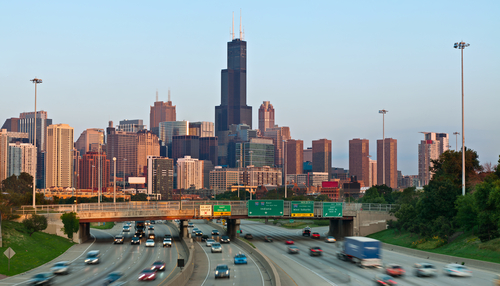
Like most states, Illinois is grappling with how to fund transportation projects amid the slowing of cash flow due to substantially reduced statewide travel from the COVID-19 pandemic.
That’s key because in Illinois a number of transportation infrastructure projects are funded by revenues derived from the motor fuel tax, the most significant source of transportation funding in the state.
The pandemic could cost Illinois as much as $560 million in motor fuel tax revenue, according to a May report from the Illinois Economic Policy Institute (IEPI) that focused on COVID-19 and transportation funding in Illinois.
“As a result of the stay at home order, businesses are temporarily closed and people are working from home and traveling less. Statewide, we’re seeing a pretty significant drop in travel,” said Mary Tyler, transportation analyst for the Illinois Economic Policy Institute.
With state Departments of Transportation and local governments losing revenue, transportation projects could be delayed or canceled altogether.
The next federal coronavirus relief package being considered in Congress aims to address state and local government revenue shortfalls and investment in infrastructure to boost the economy is also being debated.
“Federal aid, particularly for transportation, can help ensure quality jobs are not lost, the state’s transportation systems will be properly maintained, and vital transportation projects will not face delays and cancellations,” the IEPI report said.
Under three scenarios developed by the IEPI, the longer the impact of COVID-19 reverberates this year, the worse things get for Illinois. Reduced traffic volume for six months would result in an estimated annual loss of nearly $300 million in motor fuel tax revenues; more than $375 million less revenue for seven months; and approximately $559 million less for 10 months. “Under scenario three, that could be an annual loss of 22 percent if you compare that to what we would have anticipated for the motor fuel tax,” said Tyler.
In Illinois, the pandemic is also causing a significant drop in state and local tax revenues. Between 2020 and 2021, the loss of individual and corporate income taxes and sales tax revenue might cost the state $4.3 billion. If the economic downturn is long-lasting, the tax revenue decline could escalate to $28 billion by 2023, the IEPI stated, citing University of Illinois research.
Transit agencies across the nation are also suffering due to the drop in ridership.
In Illinois, a forecast by the Metra commuter train shows a plunge of 97 percent decline in ridership through April, while the Chicago Transit Authority (CTA) reported a reduction in train ridership by 88 percent. Meantime, contrasting travel between the beginning and end of March, passenger vehicle traffic was off 46 percent, while single-unit trucks experienced a 23 percent decline in travel, according to the IEPI.
The economic downturn caused by the pandemic is putting even more pressure on state and local governments that are struggling to fund critical transportation infrastructure projects.
In Chicago, even prior to the pandemic the “state of good repair” transit project backlog surpassed $19 billion, according to Regional Transportation Authority (RTA) estimates. Additionally, 20 percent of Illinois Department of Transportation roadways were considered to be in poor condition, and more than one-third of the state’s bridges were either structurally deficient or had exceeded their design life, according to recent research.
Rebuild Illinois, a six-year, $45 billion infrastructure modernization plan signed into law last June, is one program reviewed by IEPI researchers that could be hit especially hard. The capital plan was developed to address prolonged backlogs of maintenance and modernization of the state’s roads, bridges, transit systems, schools, and water and broadband systems. But one of the main sources of revenue behind the plan, motor fuel taxes, is expected to decline.
Tyler also noted that aside from the state level of future transportation revenues, almost half of the state motor fuel tax is distributed throughout the state to local governments, counties, municipalities and townships. “So it’s not only financially felt on the state level – even local projects will be impacted.”